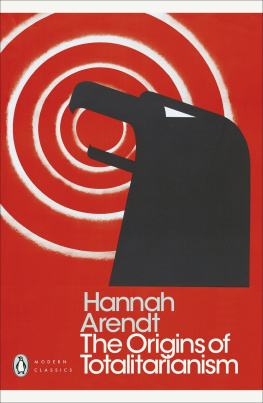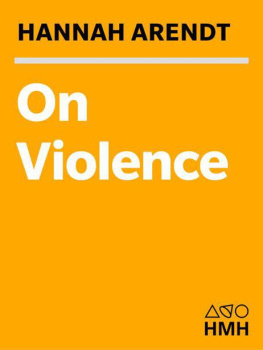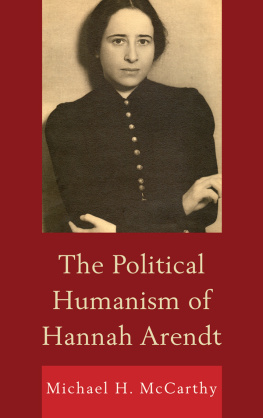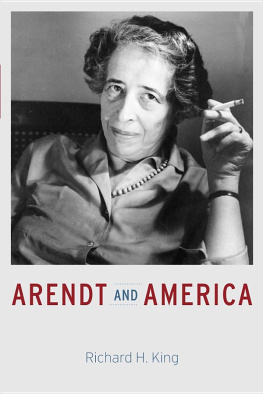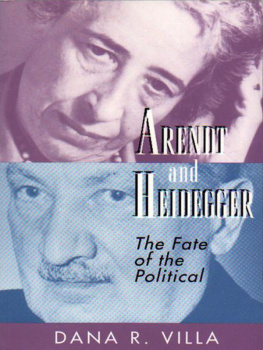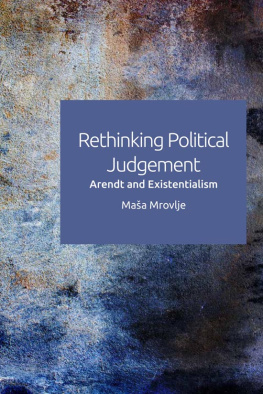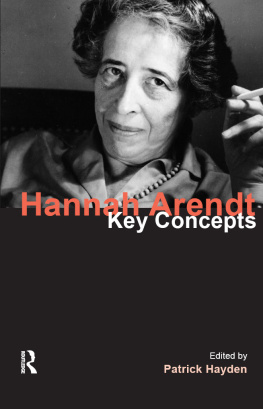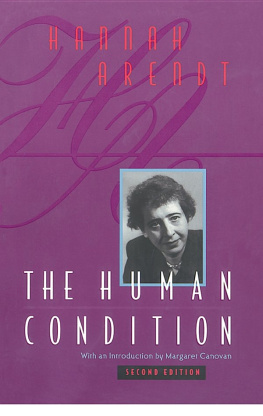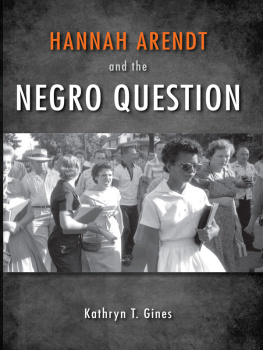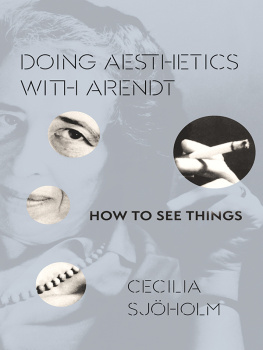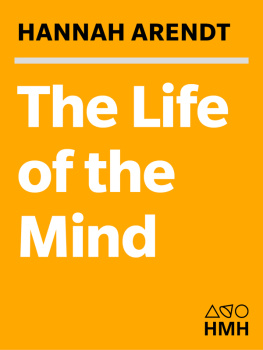Arendt - The Human Condition: Second Edition
Here you can read online Arendt - The Human Condition: Second Edition full text of the book (entire story) in english for free. Download pdf and epub, get meaning, cover and reviews about this ebook. year: 2013, publisher: University of Chicago Press, genre: Science. Description of the work, (preface) as well as reviews are available. Best literature library LitArk.com created for fans of good reading and offers a wide selection of genres:
Romance novel
Science fiction
Adventure
Detective
Science
History
Home and family
Prose
Art
Politics
Computer
Non-fiction
Religion
Business
Children
Humor
Choose a favorite category and find really read worthwhile books. Enjoy immersion in the world of imagination, feel the emotions of the characters or learn something new for yourself, make an fascinating discovery.

The Human Condition: Second Edition: summary, description and annotation
We offer to read an annotation, description, summary or preface (depends on what the author of the book "The Human Condition: Second Edition" wrote himself). If you haven't found the necessary information about the book — write in the comments, we will try to find it.
The Human Condition: Second Edition — read online for free the complete book (whole text) full work
Below is the text of the book, divided by pages. System saving the place of the last page read, allows you to conveniently read the book "The Human Condition: Second Edition" online for free, without having to search again every time where you left off. Put a bookmark, and you can go to the page where you finished reading at any time.
Font size:
Interval:
Bookmark:
The University of Chicago Press, Chicago 60637
The University of Chicago Press, Ltd., London
1958 by The University of Chicago
Introduction by Margaret Canovan 1998 by The University of Chicago
All rights reserved. Published 1998
07 06 05 04 03 02 3 4 5
ISBN: 0-226-02599-3 (cloth)
ISBN: 0-226-02598-5 (paper)
ISBN-13: 978-0-226-92457-1 (e-book)
Library of Congress Cataloging-in-Publication Data
Arendt, Hannah.
The human condition / by Hannah Arendt ; introduction by Margaret Canovan. 2nd ed.
p. cm.
Originally published: Chicago : University of Chicago Press, 1958.
Includes index.
ISBN 0-226-02599-3 (cloth : alk. paper)
ISBN 0-226-02598-5 (pbk. : alk. paper)
1. Sociology. 2. Economics. 3. Technology. I. Title.
HM211.A7 1998
301dc21
98-17015
CIP
 The paper used in this publication meets the minimum requirements of the American National Standard for Information SciencesPermanence of Paper for Printed Library Materials, ANSI Z39.48-1992.
The paper used in this publication meets the minimum requirements of the American National Standard for Information SciencesPermanence of Paper for Printed Library Materials, ANSI Z39.48-1992.
The Human Condition
BY HANNAH ARENDT
Second Edition
Introduction by Margaret Canovan

THE UNIVERSITY OF CHICAGO PRESS
CHICAGO & LONDON
Table of Contents
Introduction
Margaret Canovan
With the creation of man, the principle of beginning came into the world.... It is in the nature of beginning that something new is started which cannot be expected. (Below, p. 177)
I
Hannah Arendt is preeminently the theorist of beginnings. All her books are tales of the unexpected (whether concerned with the novel horrors of totalitarianism or the new dawn of revolution), and reflections on the human capacity to start something new pervade her thinking. When she published The Human Condition in 1958, she herself sent something unexpected out into the world, and forty years later the books originality is as striking as ever. Belonging to no genre, it has had no successful imitators, and its style and manner remain highly idiosyncratic. Although Arendt never tried to gather disciples and found a school of thought, she has been a great educator, opening her readers eyes to new ways of looking at the world and at human affairs. Often the way she sheds light into neglected corners of experience is by making new distinctions, many of them threefold, as if conventional dichotomies were too constricting for her intellectual imagination. The Human Condition is crammed with distinctions: between labor, work, and action; between power, violence, and strength; between the earth and the world; between property and wealth; and many more, often established through etymological explorations. But these distinctions are linked to a more controversial way of challenging contemporary truisms. For (in what is surely the most unexpected feature of the book) she finds in ancient Greece an Archimedean point from which to cast a critical eye on ways of thinking and behaving that we take for granted. Indeed, her calm assumption that we may be able to learn important lessons from the experience of people who lived two and a half millennia ago itself challenges the modern belief in progress. Continual references to the Greeks have added to the sense of bewilderment experienced by many readers of The Human Condition, who have found it hard to understand what is actually going on in the book. Here is a long, complex piece of writing that conforms to no established pattern, crammed with unexpected insights but lacking a clearly apparent argumentative structure. The most urgent question to be addressed by way of introduction is, therefore, what is Arendt actually doing?
Both the books difficulty and its enduring fascination arise from the fact that she is doing a great many things at once. There are more intertwined strands of thought than can possibly be followed at first reading, and even repeated readings are liable to bring surprises. But one thing she is clearly not doing is writing political philosophy as conventionally understood: that is to say, offering political prescriptions backed up by philosophical arguments. Readers accustomed to that genre have tried to find something like it in The Human Condition, usually by stressing Arendts account of the human capacity for action. Since the book is laced with criticism of modern society, it is tempting to suppose that she intended to present a utopia of political action, a kind of New Athens. Nor is this caricature entirely without foundation. Arendt was certainly drawn to participatory democracy, and was an enthusiastic observer of outbreaks of civic activity ranging from American demonstrations against the Vietnam War to the formation of grassroots citizens councils during the short-lived Hungarian Revolution of 1956. Reminding us that the capacity to act is present even in unlikely circumstances was certainly one of her purposes. But she emphatically denied that her role as a political thinker was to propose a blueprint for the future or to tell anyone what to do. Repudiating the title of political philosopher, she argued that the mistake made by all political philosophers since Plato has been to ignore the fundamental condition of politics: that it goes on among plural human beings, each of whom can act and start something new. The results that emerge from such interaction are contingent and unpredictable, matters of practical politics, subject to the agreement of many; they can never lie in theoretical considerations or the opinion of one person (p. 5).
Not political philosophy, then; and, indeed, a good deal of the book does not on the face of it appear to be about politics at all. The long analyses of labor and work, and of the implications of modern science and economic growth, are concerned with the setting for politics rather than politics itself. Even the discussion of action is only partially related to specifically political acts. Shortly after the books publication, Arendt herself described The Human Condition as a kind of prolegomena to a more systematic work of political theory which she planned (but never completed). Since the central political activity is action, she explained, it had been necessary first to carry out a preliminary exercise in clarification to separate action conceptually from other human activities with which it is usually confounded, such as labor and work.to think what we are doing, she also makes clear that what she has in mind is not just a general analysis of human activity, but a reconsideration of the human condition from the vantage point of our newest experiences and our most recent fears. What experiences and fears?
II
The prologue opens with reflections on one of those events that reveal the human capacity for making new beginnings: the launch of the first space satellite in 1957, which Arendt describes as an event, second in importance to no other, not even to the splitting of the atom. Like the Hungarian Revolution of 1956, which also occurred while she was working on the book, this unexpected event led her to rearrange her ideas, but was at the same time a vindication of observations already made. For, noting that this amazing demonstration of human power was greeted on all sides not with pride or awe but rather as a sign that mankind might escape from the earth, she comments that this rebellion against human existence as it has been given had been under way for some time. By escaping from the earth into the skies, and through enterprises such as nuclear technology, human beings are successfully challenging natural limits, posing political questions made vastly more difficult by the inaccessibility of modern science to public discussion.
Next pageFont size:
Interval:
Bookmark:
Similar books «The Human Condition: Second Edition»
Look at similar books to The Human Condition: Second Edition. We have selected literature similar in name and meaning in the hope of providing readers with more options to find new, interesting, not yet read works.
Discussion, reviews of the book The Human Condition: Second Edition and just readers' own opinions. Leave your comments, write what you think about the work, its meaning or the main characters. Specify what exactly you liked and what you didn't like, and why you think so.

